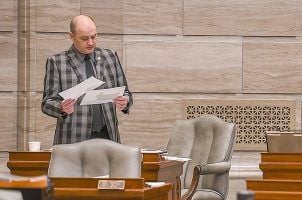Florida Anti-Gambling Leader Sowinski Moves Swiftly in Labeling New Sports Betting Legislation Unconstitutional
Posted on: November 19, 2019, 11:28h.
Last updated on: November 19, 2019, 11:51h.
The sports wagering universe was abuzz Monday after a Florida state senator proposed three bills that could set the stage for sports betting to be legalized there. But an anti-gambling expansion critic is already saying those proposals violate the Sunshine State’s constitution.

Yesterday, State Sen. Jeff Brandes (R-FL) filed SB 968, a bill that addresses sports wagering in Florida. He also put forth SB 970, a proposal for how licensing and fees related to sports betting would be handled, and SB 972, which details how related taxes would be imposed and collected.
John Sowinski, the leader of the Voters in Charge group that pushed the Amendment 3 ballot initiative in the 2018 mid-term election, moved swiftly to repudiate Brandes’s bills as violations of the Florida constitution.
Amendment 3 overwhelmingly passed with 71 percent of the vote, making it part of the state constitution.
Sorry — the bill is unconstitutional. When it comes to casino gambling — and yes, sports betting falls under that definition— the voters are in charge,” said Sowinski in a tweet posted on Monday.
His Twitter message was a reply to four parties, including Brandes, the Florida Lottery account, and two members of the media.
Not So Fast
Brandes’s SB 968, assuming it’s approved, would put the Florida Lottery in charge of the state’s sports betting operations. The structure of that proposal prompted some industry observers to immediately say Monday that the bill faces long odds because the Seminole Tribe, operator of seven Hard Rock casinos across the state, may oppose gaming expansion or want a significant slice of the sports betting action for themselves.
Sowinski maintains that Amendment 3 is clear in its treatment of casino gaming, and that sports betting falls under the auspices of casino gaming expansion.
He said that the avenue in Florida for more gaming must be proposed via a citizens constitutional amendment, and that the legislature can’t alter the constitution to that effect, or even put it before voters through a ballot initiative.
Although Amendment 3 was approved last year, an Orlando-based group known as “No Casinos,” also led by Sowinski, took to Twitter earlier today to thank voters for their help in passing the proposal, and reminded users of the social media platform that the plan passed with 71 percent of the vote.
Over the past week, “No Casinos” has sent multiple tweets along those lines.
Long Road Ahead
Amendment 3 now resides under Article X, Section 30 of the Florida Constitution, stating “that Florida voters shall have the exclusive right to decide whether to authorize casino gambling in the State of Florida.”
Sports betting “is one of the few gaming activities specifically enumerated in that act,” reports Florida Politics.
Some states have used ballot initiatives to put the sports betting question before voters, including Colorado, where Proposition DD narrowly passed earlier this month. Tribal gaming groups and policymakers in California are hoping to have a sports wagering plan on the 2020 ballot there.
Assuming Sowinski’s assessment is accurate, that the sports betting in Florida can only come to life via a citizens amendment, that could make for a long road. Several months ago, Gov. Ron DeSantis (R-FL) signed House Bill 5 into law. That legislation means anyone proposing a citizens alteration to the state constitution must garner more than 766,000 petition signatures, and certain portions of that effort must come from at least 14 of the state’s 27 congressional districts.
Related News Articles
Most Popular
LOST VEGAS: ‘Tony The Ant’ Spilotro’s Circus Circus Gift Shop
Las Vegas Overstated F1 Race’s Vegas Impact — Report
Mega Millions Reportedly Mulling Substantial Ticket Price Increase
NoMad Hotel to Check Out of Park MGM on Las Vegas Strip
Most Commented
-
End of the Line for Las Vegas Monorail
— April 5, 2024 — 90 Comments -
Mega Millions Reportedly Mulling Substantial Ticket Price Increase
— April 16, 2024 — 8 Comments -
Long Island Casino Opponents Love New York Licensing Delays
— March 27, 2024 — 5 Comments
















Last Comment ( 1 )
Tribal gaming is the cancer of all gaming in this state - if it was up to them no one would be allowed to make a bet on anything except tribal gaming - the horse players and sports bets should have been allowed when this law was passed - so instead we keep underground the state loses out on taxes which could always be used to help the state - thanks to the greed of tribal gaming